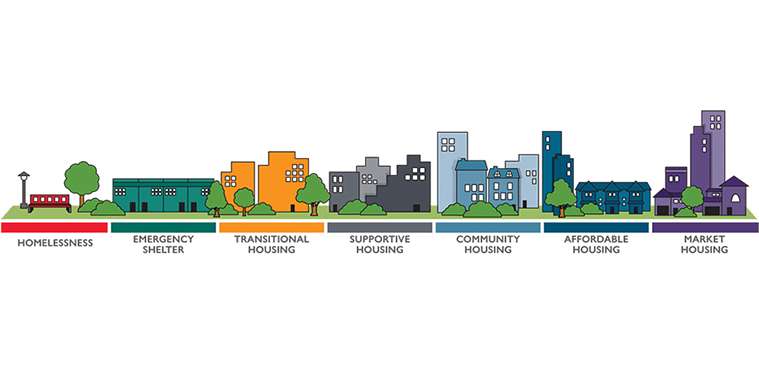The issue of housing affordability is indeed a pressing concern across Canada, and it's not surprising that it's a key topic of discussion as we prepare for the Manitoba provincial election on October 3. The Manitoba Real Estate Association (MREA) leads provincial advocacy efforts and recently released a “Blueprint for Housing Affordability.”
“Cost of living and housing affordability are top-of-mind issues during this election for Manitobans. Our report proposes specific and achievable policy recommendations for Manitoba’s incoming provincial government to safeguard and expand Manitoba’s affordability advantage within Canada,” said Manitoba Real Estate Association CEO David Salvatore. “As monthly bills rise, mortgage payments and rents increase, it is critical that industry and government work together to ensure that Manitobans have housing options across the spectrum that meet their budget, life stage, and needs.”
The surge in demand during the pandemic led to an acute housing supply crunch — and Manitobans learned just how quickly an undersupplied market can experience significant affordability pressures. While the housing market has seen a much-needed return to the type of market seen before the pandemic began, potential home buyers continue to struggle with a lack of supply, especially when it comes to “starter homes”. Even post-pandemic, REALTORS® continue to see multiple offers and sales over asking price in desirable neighbourhoods. With an ever-changing real estate market that is continually being influenced by interest rates and inflation, interested and affected parties need to work together on a thoughtful approach.
Let’s explore the three pillars with actionable solutions that can be taken by the next provincial government in order to protect Manitoba’s affordability advantage. They are as follows:
Pillar 1: Inclusivity
Promoting a market that is inclusive and accessible for underrepresented groups and first-time home buyers.
• Reform the provincial Land Transfer Tax to reduce cost barriers for first-time and lower-income homebuyers.
• Allocate a portion of the Land Transfer Tax revenue to invest in programs for underrepresented groups entering the housing market.
• Advance reconciliation and support First Nations families living off-reserve to have the opportunity to own their first home.
• Undertake a Shelter Spectrum Review, which will examine the role that government and the private sector can play to increase the impact of government programs and establish partnerships aimed at facilitating the transition from homelessness to homeownership.
Pillar 2: Sustainability
New housing development that is economical and environmentally responsible.
• Incentivize brownfield reclamation and commercial conversation projects.
• Establish a Provincial Housing Trust to help fund brownfield and contaminated site remediation.
• Continue to deliver and expand incentive-based programming that prioritizes energy-saving products and technologies.
Pillar 3: Supply
A well-supplied housing market is the foundation of an affordable housing market.
• Prioritize the development of housing-enabling infrastructure to enable new housing developments and help offset local costs.
• Create a provincial red tape reduction task force and plan for housing development growth based on best practices from across Canada.
• Conduct a comprehensive provincial land audit to identify properties for sub-division and development of new and low-to-middle-income housing.
(Source can be found at www.realestatemanitoba.com/news/manitoba-real-estate-association-unveils-a-blueprint-for-housing-affordability)
“Manitoba has the opportunity to preserve our affordability advantage in housing, but we need to act now,” said Salvatore. “MREA encourages the government to work closely with interested and affected parties to implement reforms to establish a more inclusive, sustainable, and well-supplied housing market, one where homes are affordable and accessible.”
“MREA is pleased to see the Manitoba NDP commit to a direct incentive for builders of rental properties to build additional rental units and two key policy initiatives outlined in the report,” said Manitoba Real Estate Association’s President, Chris Dudeck. “The commitments made by the Manitoba NDP will help to promote revitalization where homes and land are unused and encourage sustainable conversion projects to unlock lands for additional housing supply.”
“We are also happy to see the Manitoba PCs offer tax relief for first time homebuyers in Manitoba. Given the ongoing pressure on the cost of living and rising interest rates, housing affordability must not be taken for granted. The PCs have also committed to reduce the education property tax and eliminate it all together over the next ten years,” added Dudeck.“We believe all these commitments can help create a more inclusive market, making homeownership more affordable and attainable for all Manitobans.”
To read MREA’s report “Preserving Manitoba’s Affordability Advantage: Improving Access to Homeownership” visit www.realestatemanitoba.com/uploads/Released_SEPT-2023-Improving-Access-to-Home-Ownership or scan the QR code below.
Jeremy Davis is the Winnipeg Regional Real Estate Board’s Director External Relations & Market Intelligence.



